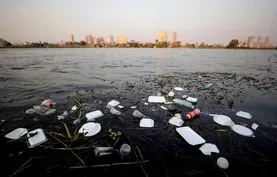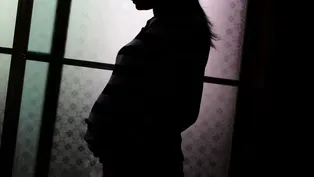
Myanmar’s humanitarian crisis worsens as civil war ramps up
Clip: 5/27/2023 | 6m 51sVideo has Closed Captions
Humanitarian crisis worsens as fighting in Myanmar’s civil war ramps up
The United Nations estimates that nearly 18 million people need humanitarian aid as a result of the civil war in Myanmar, now entering its third year. Aye Min Thant, Burmese-American journalist, and Jonathan Head, the BBC’s southeast Asia correspondent, join John Yang to discuss what’s happening.
Problems with Closed Captions? Closed Captioning Feedback
Problems with Closed Captions? Closed Captioning Feedback
Major corporate funding for the PBS News Hour is provided by BDO, BNSF, Consumer Cellular, American Cruise Lines, and Raymond James. Funding for the PBS NewsHour Weekend is provided by...

Myanmar’s humanitarian crisis worsens as civil war ramps up
Clip: 5/27/2023 | 6m 51sVideo has Closed Captions
The United Nations estimates that nearly 18 million people need humanitarian aid as a result of the civil war in Myanmar, now entering its third year. Aye Min Thant, Burmese-American journalist, and Jonathan Head, the BBC’s southeast Asia correspondent, join John Yang to discuss what’s happening.
Problems with Closed Captions? Closed Captioning Feedback
How to Watch PBS News Hour
PBS News Hour is available to stream on pbs.org and the free PBS App, available on iPhone, Apple TV, Android TV, Android smartphones, Amazon Fire TV, Amazon Fire Tablet, Roku, Samsung Smart TV, and Vizio.
Providing Support for PBS.org
Learn Moreabout PBS online sponsorshipJOHN YANG: The Civil War in Myanmar intensified this week as resistance fighters attack the governing military hunta's forces.
The United Nations estimates that nearly 18 million people need humanitarian aid as a result of the fighting, which is now entering its third year.
It follows a 2021 coup that returned the Southeast Asian nation to military rule, that was followed by a brutal crackdown on dissent, relentless attacks on civilians and an exodus of people to neighboring countries.
The turmoil has also led to a rush to exploit Myanmar's natural resources.
Gold, jade, luxury wood and other commodities are reaching the international market despite U.S. sanctions.
Earlier, I spoke with Aye Min Thant, a Burmese American journalist and Jonathan Head, Southeast Asia correspondent for the BBC.
I asked Jonathan, what led to what's going on now?
JONATHAN HEAD, Southeast Asia Correspondent, BBC: Well, I think you've got to look at the painful history that Myanmar has had pretty much since World War II, it's mostly been under military rule.
There were protests all the way through that periods, periodic protests, big ones in 1988 that were crushed very violently.
And that's when we first saw the appearance of Aung San Suu Kyi, this figure who was enormously popular, the daughter of a hero of the independence movement, but the first election -- the first free election in in decades was held in 2015.
And perhaps the military didn't expect this but Aung San Suu Kyi did incredibly well.
But when the second election came around in 2020, she did even better.
Her party want to resounding majority and that seems to have been too much for the generals.
They felt they were losing too much control.
Her relationship with the top general Min Aung Hlaing wasn't good.
And just as she was about to summon parliament to start her second term of office, he launched this coup.
And when the military did it, you saw massive protests.
And the military has just used the most incredible levels of force to put them down.
And we've now ended up in a situation where that protest movement because it's been forced underground has kind of evolved into a full scale civil war.
JOHN YANG: And Aye, the resistance or the insurgents who are opposing the military regime?
Who's in that and what do they want AYE MIN THANT, Burmese-American Journalist: So there's quite a number of different groups when you're talking about opposition to the Myanmar military.
So you have the armed ethnic, the armed groups from those largely ethnic minority populations that have been resisting against the federal government for a long time.
So those groups have been resisting and are now teaming up with new armed groups that have been enough since the coup, some of them are in coalition with one another.
But many of them are also operating independently.
And many of them are in sort of collaboration with the civilian government, the national unity government, but also are largely coordinating a lot of the armed resistance.
JOHN YANG: Jonathan, you're in Myanmar, I think, last month, what was it like?
What did you see and what was life like for the average citizen, the average person?
JONATHAN HEAD: John, I have to qualify that by saying, and we were allowed in for the first time since the coup and under quite strict conditions, but actually talking to people there.
They're extremely concerned.
And it turns out, there have actually been, the fighting has spread local people, particularly young people who are very frustrated by this coup, and by the terrible economic consequence of the coup, the economies more or less collapse.
So what I -- the impression I got was real misery.
People were terrified that the conflict was going to spread to their areas.
They were terrified of the retribution that would come to them if their own young people took up arms.
And they were absolutely devastated by the economic impact.
JOHN YANG: And Jonathan sort of described the repression for people, you said, you told our producers that you left because you felt unsafe, could you talk about the threat you felt?
AYE MIN THANT: So you know, I used to work at Reuters and my colleagues were put in prison for over 500 days, simply for trying to cover story about the range of genocide.
And after the coup, the repression against journalists really ramped up, in addition to what was already happening.
My own apartment was sort of entered into by my landlord and the local administrative departments, and it was rated as well.
And, you know, a number of my friends and colleagues had been arrested by that point.
And I felt that in order for me to continue doing my job in order to not be imprisoned, essentially, I needed to leave the country.
JOHN YANG: And on that point, Jonathan, I'm going to ask, Aye, I'm going to ask you the same question.
Where do you think this is going?
Can you see how this might end?
JONATHAN HEAD: I can't see it, John, at the moment, because you've got to try and get inside the mindset of these generals who launched this coup, they obviously miscalculated catastrophically.
They never saw this incredible popular resistance.
But they do see themselves and they talk about it this way.
Still, as the core institution, the country is the essential institution, they think they have a right to do what they've done.
They're very embattled.
They've committed dreadful crimes against humanity.
I think for the leaders, they must be thinking either we're going to be torn to pieces by the population, or we'll end up at an international war crimes court.
So, it's almost like they've got nowhere to go.
They are not talking to anyone, there's literally no dialogue.
I mean, I think there should be a diplomatic way out, because the human suffering is immense inside there.
And it's going to get worse.
But you know, U.S. influence is not that big in this region anymore.
European influence isn't that big.
And the other countries are kind of pursuing their own interests.
JOHN YANG: Aye, the same question, do you do you see a pathway to descending, AYE MIN THANT: There isn't really a place for the military to go, given the path that it's going on right now.
It can't really back down in a way that would spell any kind of success for them.
And for the resistance -- beside of the resistance.
People have lost so much in the last two years.
All of the benefits that liberalization that democratization in the last decade has brought have been rolled back.
And so I think it's much harder to repress a population that has tasted freedom as opposed to one that was fighting for something that they had never really experienced.
JOHN YANG: Burmese American journalist, Aye Min Thant and Jonathan Head of the BBC, thank you both very much.
JONATHAN HEAD: Thank you, John.
AYE MIN THANT: Thank you.
How the UN aims to sharply reduce plastic pollution by 2040
Video has Closed Captions
Clip: 5/27/2023 | 7m 27s | The UN wants to drastically reduce plastic pollution by 2040. Here’s how (7m 27s)
How the U.S. is addressing its maternal mortality crisis
Video has Closed Captions
Clip: 5/27/2023 | 6m 6s | What the U.S. is doing to address its deepening maternal mortality crisis (6m 6s)
Providing Support for PBS.org
Learn Moreabout PBS online sponsorshipSupport for PBS provided by:
Major corporate funding for the PBS News Hour is provided by BDO, BNSF, Consumer Cellular, American Cruise Lines, and Raymond James. Funding for the PBS NewsHour Weekend is provided by...













